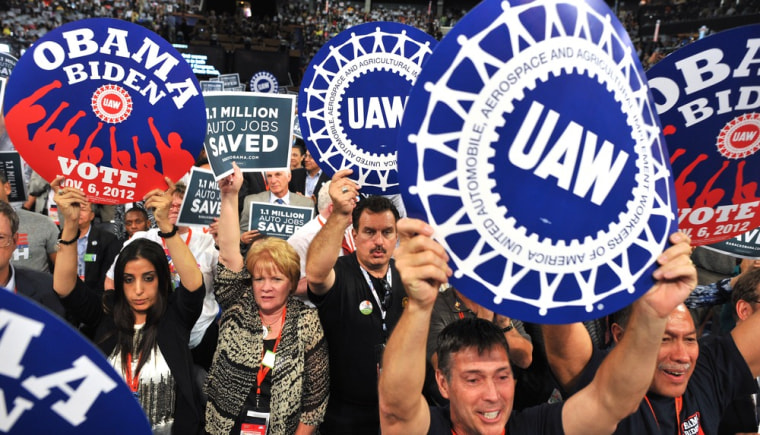By Ben Adler
Charlotte, N.C.—The Democratic National Convention got off to a slow start on Wednesday evening with a string of unexceptional speeches. But shortly before the network television coverage hour began at 10 p.m., the Democrats found their voice and honed in on a sharp, compelling message.
If Tuesday was focused on women’s rights—notwithstanding the DNC’s claim that they are not doing themed nights—then Wednesday was the evening of economic populism. Echoing themes that electrified the delegates when former Ohio Gov. Ted Strickland touched on them Tuesday, the DNC featured primetime speakers explaining the difference between President Obama’s economic record and Mitt Romney’s.
They emphasized two major points: That President Obama saved the auto industry and Midwestern economy while Romney profited from laying off workers and shipping jobs overseas, and that Obama would enhance tax fairness while Romney and his running mate Paul Ryan would decrease it.
To illustrate the first two points, the Democrats presented speeches by two regular American workers. First came General Motors autoworker Karen Eusanio, whose mother and brother also worked for GM. She was laid off in the economic downturn, but credited Obama and the auto bailout with reviving the industry. Now she is back at work.
United Auto Workers president Bob King followed Eusanio. He contrasted Romney’s infamous suggestion to “Let Detroit Go Bankrupt” with Obama’s actions to save the auto industry. Furthermore, he cleverly tied that auto bailout to Obama’s support for workers’ rights and pro-labor policies. The audience, heavy on union members, rose its feet. Obama, King argued, cares about workers, while Romney doesn't.
To illustrate that latter point, the DNC brought out Randy Johnson, Cindy Hewitt, David Foster. All three were employed by companies that were bought by Bain Capital. And all were eventually laid off. Hewitt saw her company driven into bankruptcy, while Johnson watched as his steel mill was loaded up with debt and the borrowed millions went to pay Bain partners. It was Johnson who delivered one of the most memorable lines of the evening, to passionate applause:
I don't think Mitt Romney is a bad man. I don't fault him for the fact that some companies win and some companies lose. That's a fact of life.What I fault him for is making money without a moral compass. I fault him for putting profits before working people like me. But that's just Romney economics.
Anticipating the response that putting profits before working people is just in the nature of efficient capitalism, the DNC brought out corporate leaders who follow a different path: Austin Ligon, co-Founder and former CEO of CarMax, and Costco co-founder and former CEO Jim Sinegal.
“At our company, we recognize that job creation requires time and investment and commitment to the long term,” said Sinegal. “It requires companies that plant and grow, not executives who reap and run… And we're proud that Costco pays the highest wages among our peers, that we provide benefit and health care plans that are second to none.”
Finally came the two headliners, Massachusetts Senate candidate Elizabeth Warren and former President Bill Clinton. Warren has made her name advocating for economic fairness and sensible regulation of the financial industry. Grassroots Democratic activists love her for it. The crowd greeted her with a standing ovation, and she brought them to their feet again with the following riff:
Mitt Romney's the guy who said corporations are people. No, Governor Romney, corporations are not people. People have hearts, they have kids, they get jobs, they get sick, they cry, they dance. They live, they love, and they die. And that matters. That matters because we don't run this country for corporations, we run it for people. And that's why we need Barack Obama.
Clinton issued a more comprehensive defense of President Obama’s first term. But he was sure to interweave notions of economic justice and opportunity, mentioning investments in everything from health care to making college more affordable.
Some wags might have worried that the emphasis on issues like reproductive freedom and marriage equality in the DNC’s first night would turn off working class white men. Well, Wednesday night was for them.

